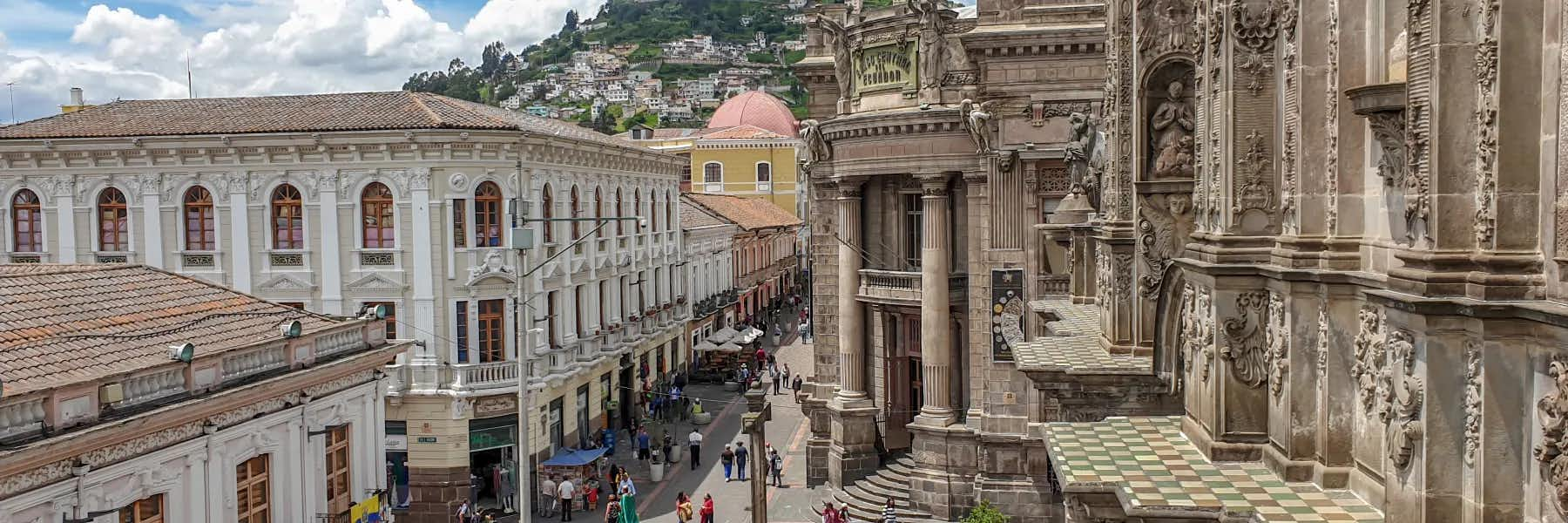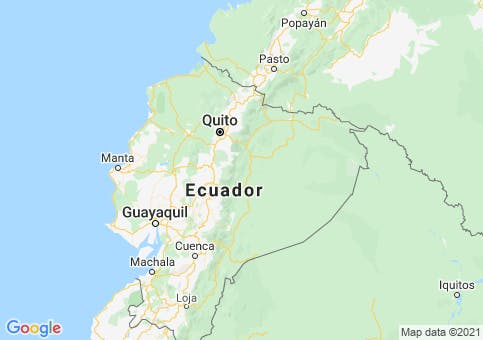The prices of real estate in Ecuador have risen slightly in recent years thanks to Ecuador's growing economy, but they are still inexpensive in comparison with U.S. prices and downright cheap when compared with real estate in Europe. As property prices are steadily appreciating, now is a great time to invest in Ecuador real estate.
An oil boom--created by the completion of a new oil pipeline to the coast, combined with record oil prices in 2006--has also added even more intrinsic value to a property investment in Ecuador. Combine this with Ecuador's equatorial sunshine, the choice of spectacular mountains, high plains, jungle, or coastal settings, and the unvaryingly friendly and welcoming nature of Ecuador's people, and you have a combination for a quality of life that's hard to beat.
The World’s Best Retirement Havens for 2025
The World’s Best Retirement Havens for 2025
To get further information on Ecuador and more retirement destinations, sign up to receive your free report: 20 Countries Compared, Contrasted, Ranked, and Rated. You don’t have to be rich to enjoy a pampered retirement, you just need to know where to go.
With our 34th Annual Global Retirement Index, our experts hand you a detailed roadmap. Details and a Special Offer Here!

By submitting your email address, you will receive a free subscription to IL Postcards, Overseas Dream Home, The Untourist Daily and special offers from International Living and our affiliates. You can unsubscribe at any time, and we encourage you to read more about our Privacy Policy.
Cuenca
Cuenca is Ecuador’s third-largest city and the economic center of the southern Sierra. It has an intellectual, artistic, and philosophical tradition that matches its colonial architecture. Because of its history and state of preservation, Cuenca is one of Ecuador’s three UNESCO World Heritage Trust sites (the others are Quito and the Galapagos Islands).
In 2006, an international association of urban planners voted Cuenca as one of the two “most livable” cities in Latin America, citing its culture, low crime rate, and “middle class” feel. And in 2009, IL voted Cuenca the best city in the world to retire to. For the fourth year running, Ecuador has won IL's annual Global Retirement Index in 2013 and took gold again in 2015.
With the best restored colonial district in Ecuador, Cuenca is the country’s cultural capital. The city has produced many of Ecuador’s major writers, artists and musicians, and offers a rich program of festivals, concerts, parades and art openings. Although the metropolitan population is 450,000, the central city has a small town feel that has proven popular with tourists and foreign students who attend language schools or one of the city’s seven universities.
Referred to by one travel guide as “South America’s most European city”, Cuenca is attracting growing numbers of foreigners, many of whom have purchased modern but inexpensive apartments just outside the colonial district. Others prefer to take advantage of bargain houses and views on the hills that surround the city.
The World’s Best Retirement Havens for 2025
The World’s Best Retirement Havens for 2025
To get further information on Ecuador and more retirement destinations, sign up to receive your free report: 20 Countries Compared, Contrasted, Ranked, and Rated. You don’t have to be rich to enjoy a pampered retirement, you just need to know where to go.
With our 34th Annual Global Retirement Index, our experts hand you a detailed roadmap. Details and a Special Offer Here!

By submitting your email address, you will receive a free subscription to IL Postcards, Overseas Dream Home, The Untourist Daily and special offers from International Living and our affiliates. You can unsubscribe at any time, and we encourage you to read more about our Privacy Policy.
Property samples in Cuenca:
A four year–old, three-bedroom, two-bath condo in a quiet neighborhood. It comes mostly furnished, featuring nearly new appliances, granite countertops and has its own parking space. The Yanuncay River is nearby along with shopping centers and bus lines. Price: $130,000.
A new home in a gated community 15 minutes outside of the city. It has one story and 1,600 square feet, and comes with three bedrooms and two-and-a-half bathrooms. It is close to the PanAmerican Highway making access to public transportation easy. The design is open and airy and features large windows and plenty of privacy. Price: $144,000.
Ecuador's Captial: Quito
Quito has been described as the most beautiful city in South America. Spanish influence here is apparent in its stately colonial architecture. Though the city has about 1.5 million residents, traffic is reasonable, except at rush hour and during major road resurfacing projects. The public transportation system, including taxis, buses, and trams, is excellent.
The area is ringed by staggering Andean peaks, providing beautiful views from many properties. The city is in the process of restoring the old colonial center.
Property samples in Quito:
A late 19th-century, four-bedroom, two-bathroom home, located in the heart of Colonial Quito. The house is loaded with charm but needs restoration work. Rooms are large and the living room opens onto an inner courtyard. The house is one story but has a wonderful rooftop terrace with great rooftop view of Colonial Quito. Price: $90,000 (negotiable).
A charming two-story townhouse in north Quito with four bedrooms and three bathrooms. It features floating laminate flooring, sleek glass bathroom fixtures, and plenty of natural lighting. Comes with city views and manicured yard.Price: $112,000.
Real Estate on the coast: Manta
If you’d like to look out your window at the sparkling ocean and pristine beaches, but also have the opportunity to step outside to a bustling city if the beach life becomes too relaxing…then Manta, on Ecuador’s coast, is your best bet. With a population of 250,000, Manta is Ecuador’s only coastal metropolis and offers the same transportation, medical, and communication services as the larger cities of Quito and Guayaquil.
A recent university study of population trends predicts that Manta will be Ecuador’s second most popular expat destination over the next 25 years, trailing only the Andean city of Cuenca.
Property sample in Manta:
A two-bedroom, three-bath unit on the third floor of a small condo building. Situated in a quiet and safe neighborhood, amenities such as shopping and fine dining are minutes away. The building has its own pool and beautiful ocean views. Price: $135,000.
The World’s Best Retirement Havens for 2025
The World’s Best Retirement Havens for 2025
To get further information on Ecuador and more retirement destinations, sign up to receive your free report: 20 Countries Compared, Contrasted, Ranked, and Rated. You don’t have to be rich to enjoy a pampered retirement, you just need to know where to go.
With our 34th Annual Global Retirement Index, our experts hand you a detailed roadmap. Details and a Special Offer Here!

By submitting your email address, you will receive a free subscription to IL Postcards, Overseas Dream Home, The Untourist Daily and special offers from International Living and our affiliates. You can unsubscribe at any time, and we encourage you to read more about our Privacy Policy.
How to Purchase Ecuadorian Real Estat
Keep in mind that the real estate business in Ecuador bears little resemblance to what you are probably accustomed to in North America or Europe. There is no such thing as a multiple listing service, for example. Agents in Quito will have no idea what’s available in Manta or Cuenca—or even what’s available from other agents in Quito
Purchasing procedure
You’ll find that buying a property in Ecuador is more straightforward than you may be accustomed to back home. For example, there are no title or escrow companies, and sellers and buyers are required to pay their own debts outside the sales process, such as insurance, real estate commissions, etc. These issues are not brought to a closing, which is strictly between the buyer, seller, and the notary. Your attorney should be able to guide you through the purchase process, and help you to avoid potential pitfalls.
Remember that in Ecuador, as in most Latin American countries, cash is king. Interest rates are still high here compared to the U.S. so if you can pay with cash you will gain significant bargaining power. We’ve seen several shoppers submit offers of half the original asking price who ended up paying 60% or 70% of the original price.
Buying restrictions
Foreigners and Ecuadorian natives are on equal footing when it comes to real estate. You do not need to be a resident to own property. To the contrary, property ownership can qualify you for residency. There are certain restrictions in the case of “National Security Areas,” which may include the country’s borders, although these areas are not specifically defined in the law. Your attorney or the notary will inform you if your property requires any type of permission.
Why Should You Consider Buying Real Estate In Ecuador?
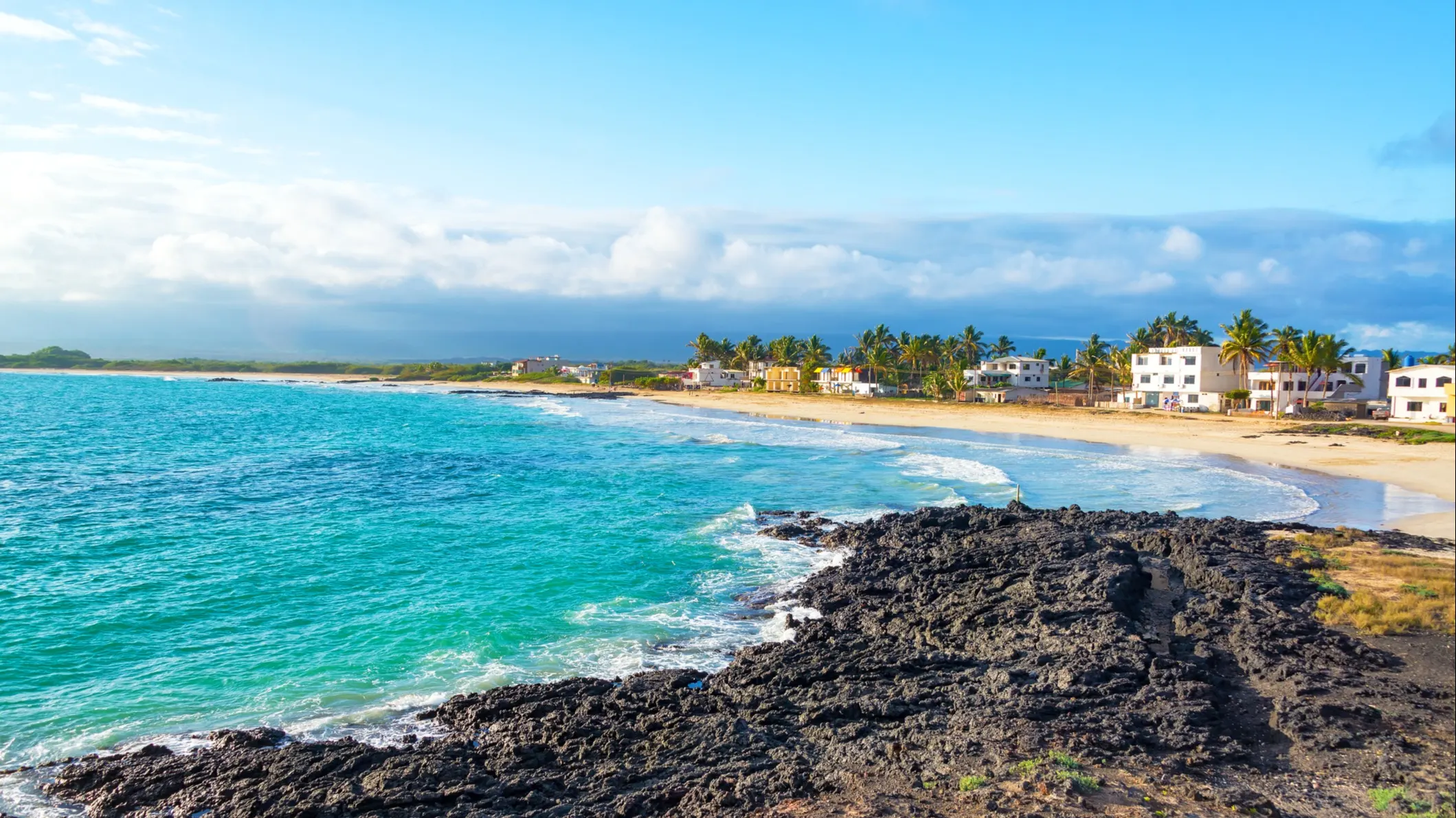
Ecuador is unique. There are many places around the world where you can find cheap land, Ecuador included. But in many of those places, you’d lead an uncomfortable life, far from friends and family and disconnected from the rest of the world. Not so in Ecuador.
In this country, you can golf on breathtaking courses where you never have to make a tee time. You can have a driver, a cook, and a maid for a fraction of the cost you’d pay back home. You can eat a gourmet meal in world-class restaurants of every cuisine at prices unheard of in Los Angeles, New York, or London. You can cook for yourself using market-fresh fruits and vegetables seen only in specialty shops up north.
Daily flights connect Ecuador to major hubs throughout the hemisphere. Cell phones are everywhere. Internet cafés are easy to find, and home computer hookups are common.
Do you thrive on the hustle and bustle of the city? Are you drawn to high mountain valleys where cowbells are more common than car horns? Do you crave sun, sand, and crashing surf? Have you always wanted to have your own horse, and ride it into town for lunch? Your only real problem in Ecuador is deciding where to live.
A Step-By-Step Guide To Buying Property In Ecuador
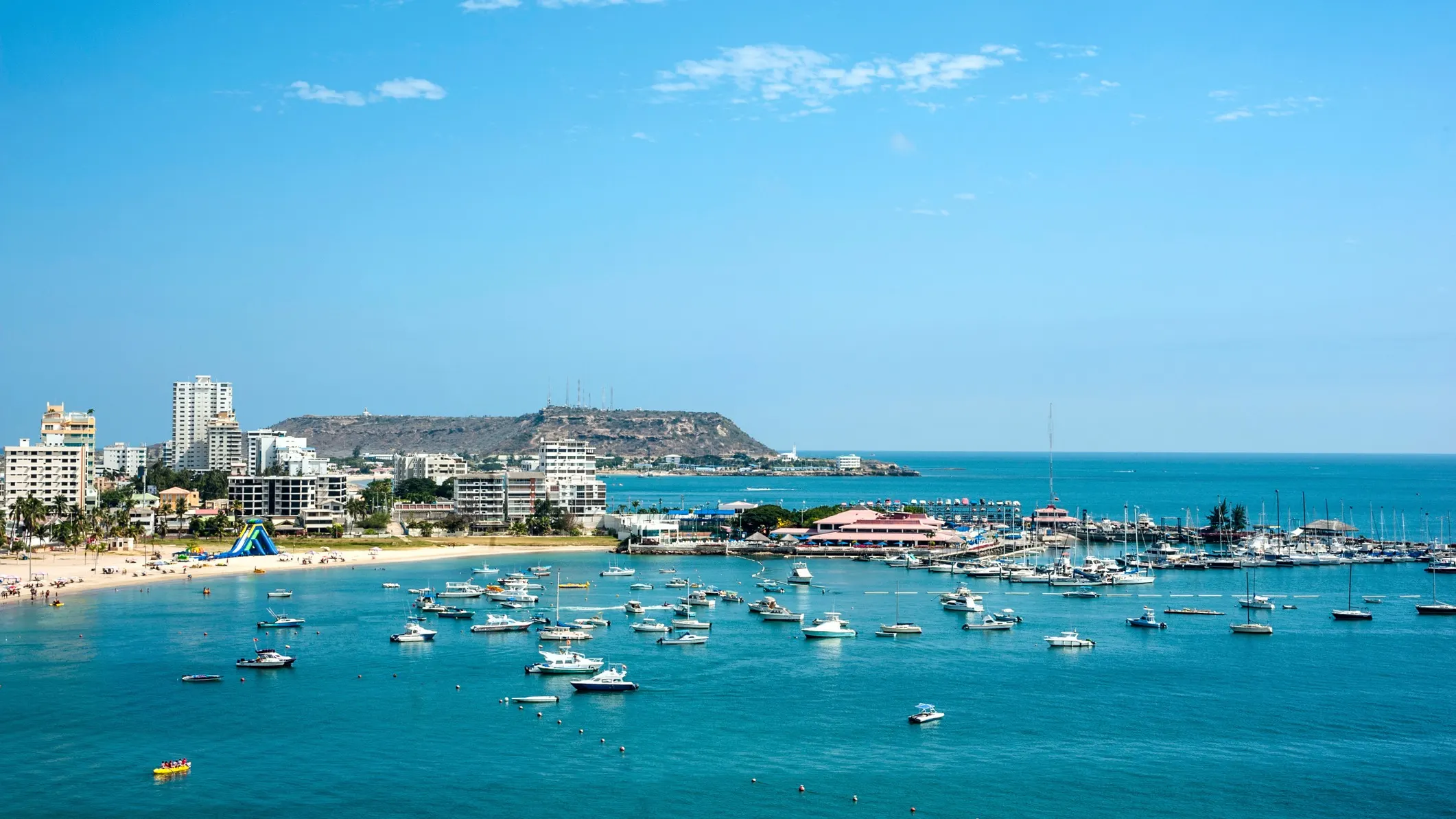
You’ll find that buying property in Ecuador is pretty straightforward. You won’t have to deal with a middleman. Nor are there title companies, and sellers and buyers are required to pay their own debts outside the sales process, like insurance, taxes, real estate commissions, etc. These issues are not brought to a closing, which is strictly between the buyer, seller, and the notary.
As always in a foreign country, be sure to engage a qualified local attorney, and he or she should be able to manage the transaction with few complications, avoiding potential pitfalls.
Step 1: Title Search
Once you have agreed on a price with the seller, have your attorney check the title. It is essential to have your attorney ensure the title is free and clear, without any liens or encumbrances.
Step 2: Sign the Promise to Buy
If you are not purchasing immediately, your attorney will prepare a promesa de compraventa, or “promise to buy.” This binding, notarized document is signed by both buyer and seller, and will state the closing date of the purchase and the purchase price, as well as any penalties for default or other interim conditions of the sale. This is usually accompanied by a 10% down payment to the seller, which is typically non-refundable unless otherwise stipulated in the contract. If you are ready to purchase the property immediately, you can forgo the promesa de compraventa and move right to the compraventa (Step 3), which will mean savings in legal fees and notary charges.
The World’s Best Retirement Havens for 2025
The World’s Best Retirement Havens for 2025
To get further information on Ecuador and more retirement destinations, sign up to receive your free report: 20 Countries Compared, Contrasted, Ranked, and Rated. You don’t have to be rich to enjoy a pampered retirement, you just need to know where to go.
With our 34th Annual Global Retirement Index, our experts hand you a detailed roadmap. Details and a Special Offer Here!

By submitting your email address, you will receive a free subscription to IL Postcards, Overseas Dream Home, The Untourist Daily and special offers from International Living and our affiliates. You can unsubscribe at any time, and we encourage you to read more about our Privacy Policy.
Step 3: Sign the Purchase Agreement
Once you are ready to proceed with the purchase, both parties will sign (in the office of a notary) the purchase document, called a compraventa. Your attorney will have prepared this document in Spanish. To ensure that you are aware of all its terms, you should obtain a fully translated version. Moreover, if you are not fluent in Spanish, Ecuadorian law requires that a qualified translator represent you during the process. (This translator should not be your real estate agent.) If you claim fluency, most notaries will engage you in a brief conversation to assure themselves that you are. At this stage, you will pay the seller the agreed purchase price, or the outstanding balance if you’ve signed a prior agreement.
Step 4: Register Your Property and Pay Taxes
Your attorney will then arrange for the necessary tax payments and register your property at the land registry. The fee for this registration is minimal, and you’ll need two certified, notarized copies of your completed compraventa, as well as proof that any required fees and taxes have been paid. The registry will perform its own title verification, register the property, and return one registered (stamped) version to you for retention, keeping the other for its records. This is your final deed to the property. The process for registration and the fees required may vary slightly in different parts of Ecuador, but your local attorney will be familiar with these requirements. If you can’t be in Ecuador for any of the transactions that require your presence, you can give power of attorney to a friend or your lawyer at any notary office or Ecuadorian consulate.
The World’s Best Retirement Havens for 2025
The World’s Best Retirement Havens for 2025
To get further information on Ecuador and more retirement destinations, sign up to receive your free report: 20 Countries Compared, Contrasted, Ranked, and Rated. You don’t have to be rich to enjoy a pampered retirement, you just need to know where to go.
With our 34th Annual Global Retirement Index, our experts hand you a detailed roadmap. Details and a Special Offer Here!

By submitting your email address, you will receive a free subscription to IL Postcards, Overseas Dream Home, The Untourist Daily and special offers from International Living and our affiliates. You can unsubscribe at any time, and we encourage you to read more about our Privacy Policy.
Ecuadorian Real Estate Taxes
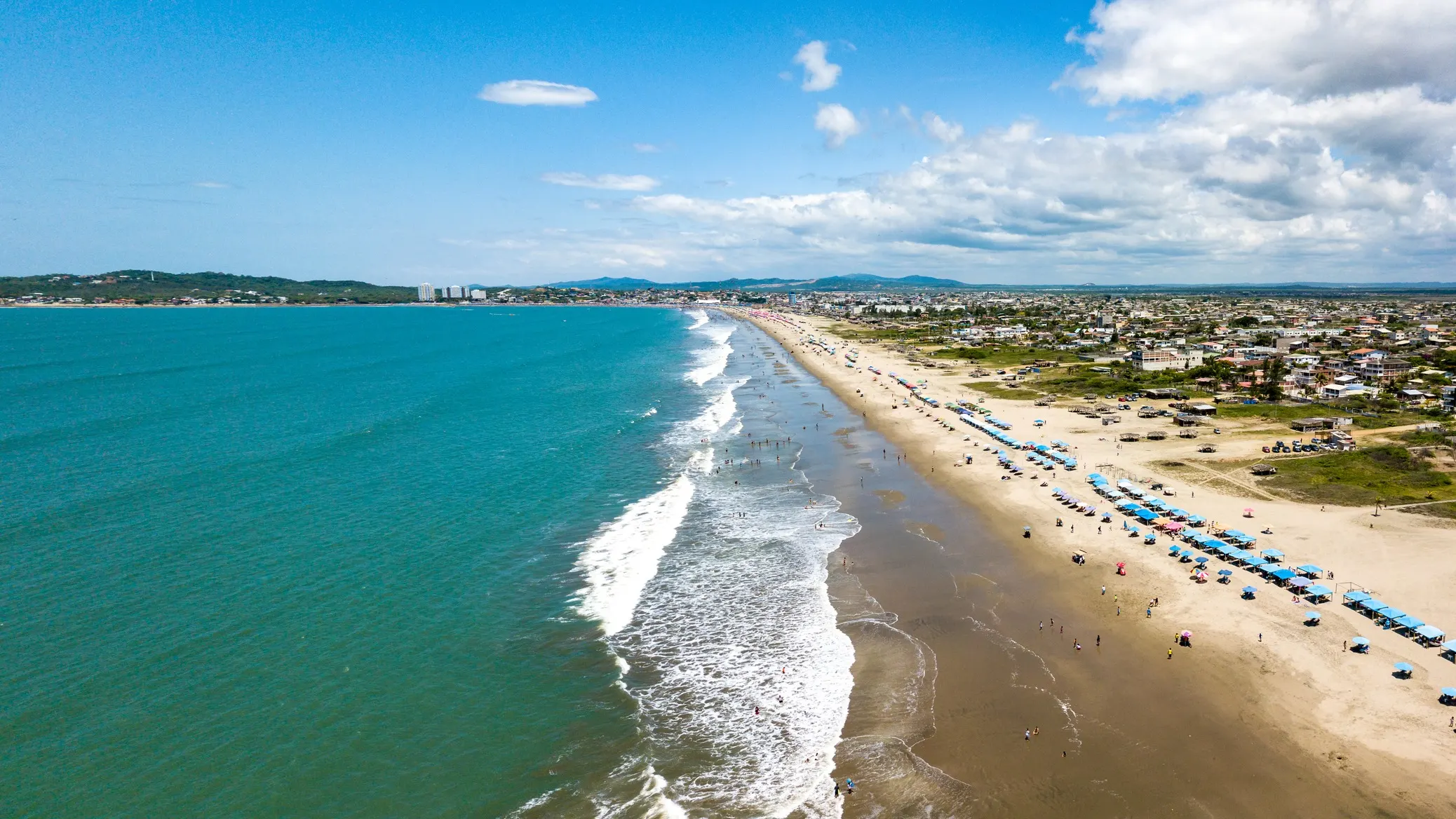
As with many U.S. locations, taxes in Ecuador are based on the municipal value (assessed value), which tends to be about 2% to 2.5% of the purchase price (market value). This amount depends on the province and canton in which the property is located. Ecuador is divided into 22 provinces, which are split into 205 cantons). Different levies apply for rural property and urban property. For example, tax records currently show a rural house costing $34,000 that has a municipal value of $250, while an urban home costing $170,000 has a value of $4,250.
Transfer Tax
There is a registration tax levied for recording the transfer of any real property. The amount charged is 1% of the municipal value shown in the deed, and is payable by the buyer.
Sales Tax
VAT is levied on most goods and services at a standard rate of 12%. This does not apply on the transfer of real estate in Ecuador.
Property Tax
Residential property taxes are based on a percentage of the municipal value of the property, with city and rural properties being taxed at different rates. To use the examples above, the $170,000 house is currently on the city of Cuenca’s tax roles for an annual property tax of $110. The $34,000 rural property mentioned is on Loja’s roles for $7.50.
Homeowners over the age of 65 pay less than half of these rates. Commercial property tax is calculated according to a different schedule.
Rental Income
Rental income derived in Ecuador is subject to regular income tax. This is charged at progressive rates, ranging from 0% to 25%.
Capital Gains Tax
Any gain on the sale of property is subject to capital gains tax, up to a maximum of 25% of the net gain in municipal value. For example, if you sold the $170,000 house mentioned above (municipal value $4,250) for $270,000 (estimated municipal value of $6,250), you’d pay tax on the difference in municipal value of $2,000, which would result in a tax of just over $500 on the $100,000 actual gain.
Inheritance/Gift Tax
Inheritance tax is levied on a graduated scale at the regular income tax rate of between 5% and 25%. There is no gift tax, unless the gift requires a legal transfer of property. For example, if you give someone half your house, and go to the city to put it in his name, the recipient will have to pay tax on his portion of the property’s municipal value. Cash or other property gifts are not taxed.
Other Taxes
Alcabalas tax is charged on the transfer of real property at the time of registry. The amount levied depends on the value of the property, and ranges from as little as 10%, up to a maximum of 38% of the municipal value. There is an additional tax charged, which is about 1% of the amount paid for alcabalas tax. Water tax is sometimes collected, and is again 1% of alcabalas tax.
The former financial transactions tax (FTT) levied on many banking transactions has been abolished.
Real Estate Buyer’s Fees In Ecuador
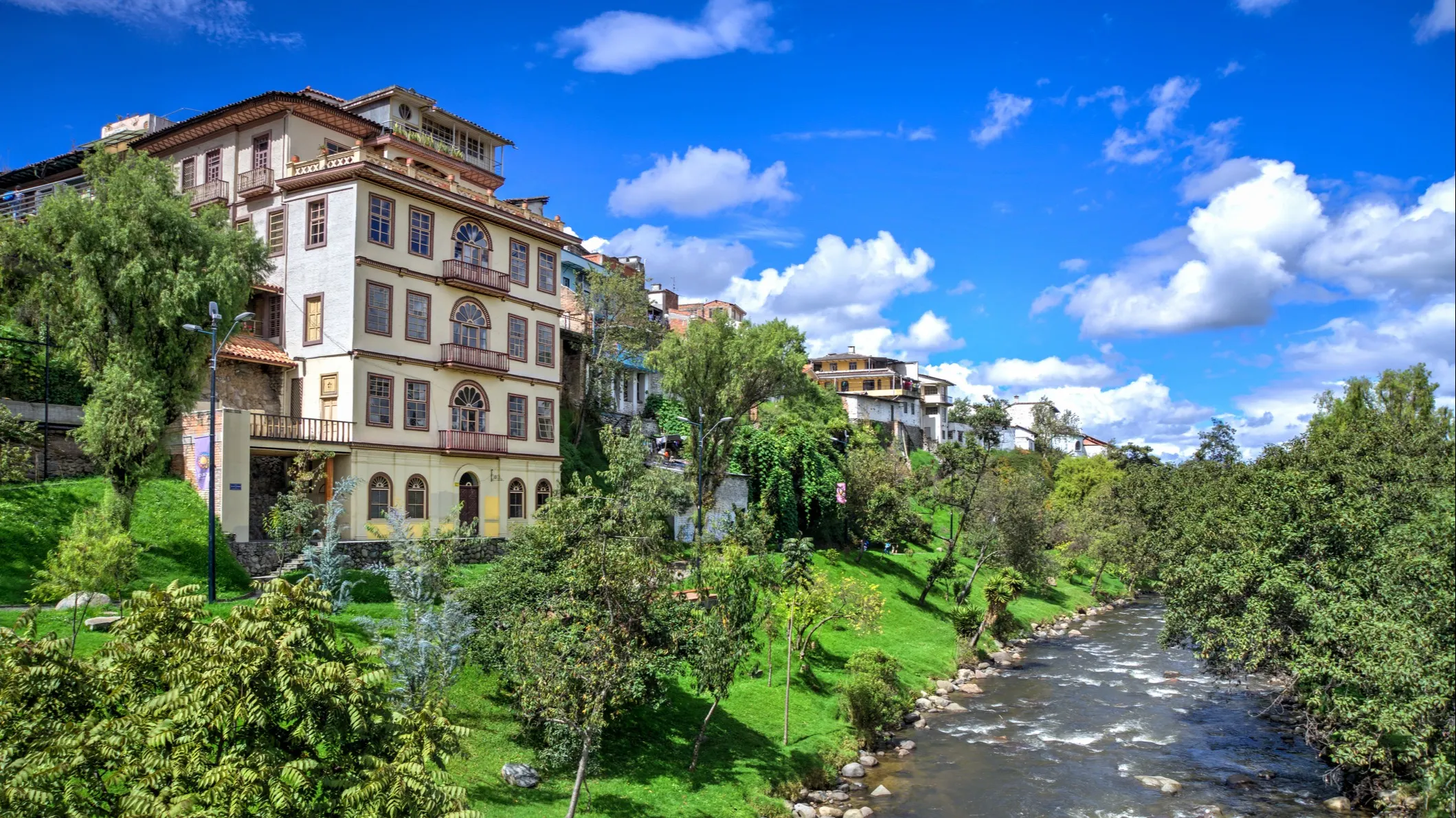
It is typical in Ecuador to pay a fee to the agents who are scouting properties on your behalf and showing you around. At first, this really went against the grain of how we at International Living are accustomed to doing business, but after a few years of struggling to find the best buys on inexpensive properties, it’s come through as the best method.
For starters, unlike a “normal” real estate company, many of these people are showing properties that they learned about by word of mouth or from the local papers. Often the owners of these less-expensive properties are not willing to list with an agent and won’t pay commissions. We’ve found that straying from the agencies has led us into a whole new market, where the buys have been much better.
What you get when you hire this type of contact is a personal agent who is working for you, rather than for the seller’s commission. For the fee that you may pay them, they’ll be at your beck and call, being your representative for any number of tasks. When a commission is paid by the seller, the daily fee is often refundable.
Of course, there is still a multitude of good real estate companies that work in the traditional fashion. Their commissions run between 3% and 5%, and are normally paid by the seller.
Regardless of who you use, you’ll get the same good service. Just be sure to clarify terms or fees up front.
The World’s Best Retirement Havens for 2025
The World’s Best Retirement Havens for 2025
To get further information on Ecuador and more retirement destinations, sign up to receive your free report: 20 Countries Compared, Contrasted, Ranked, and Rated. You don’t have to be rich to enjoy a pampered retirement, you just need to know where to go.
With our 34th Annual Global Retirement Index, our experts hand you a detailed roadmap. Details and a Special Offer Here!

By submitting your email address, you will receive a free subscription to IL Postcards, Overseas Dream Home, The Untourist Daily and special offers from International Living and our affiliates. You can unsubscribe at any time, and we encourage you to read more about our Privacy Policy.
Foreign Ownership Issues In Ecuador
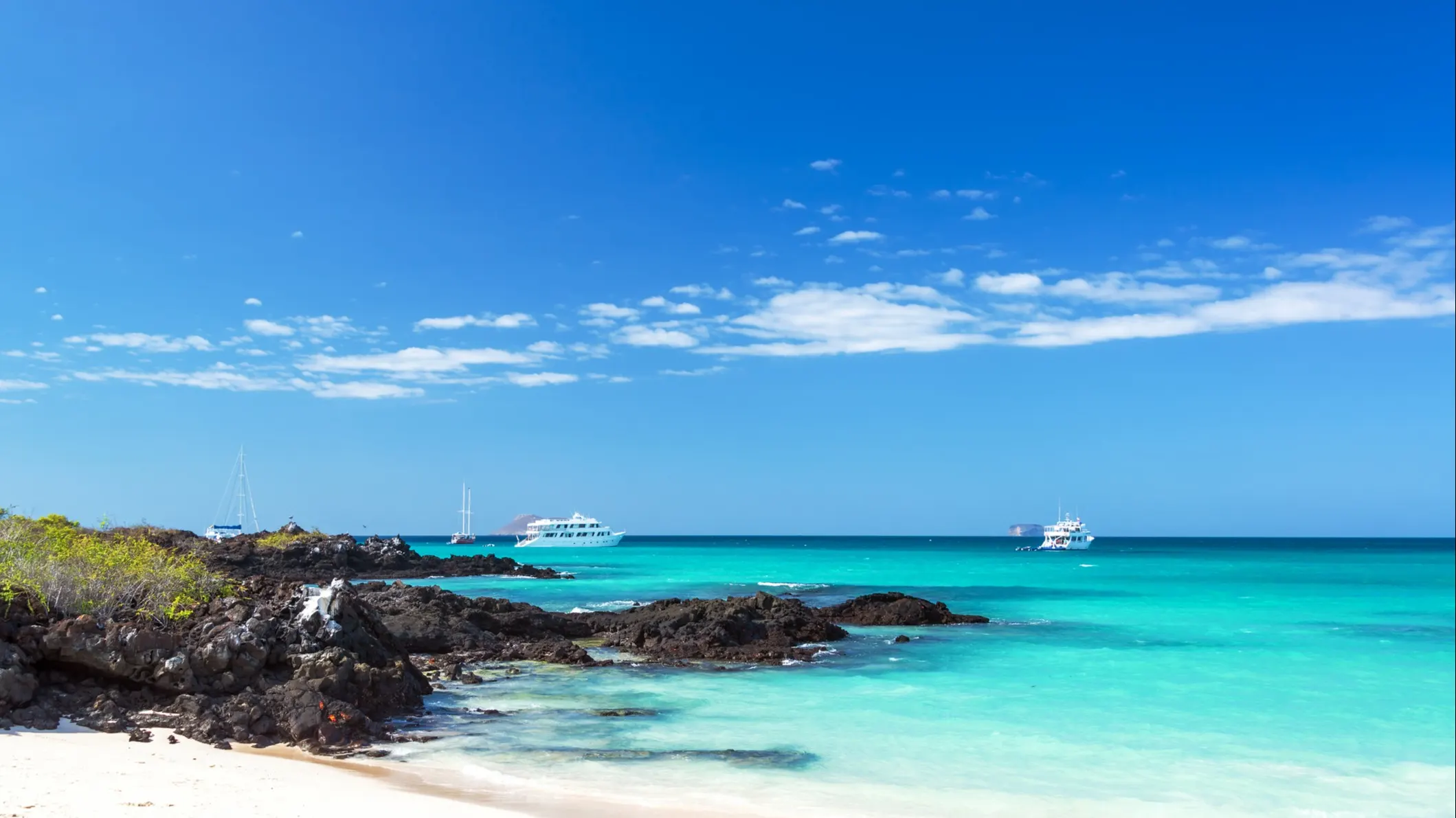
For matters of real estate, foreigners and Ecuadorian natives are almost on an equal footing. There are restrictions on ownership of property that lies within 50 kilometers of the coast or an international border. Foreigners must request permission (which is routinely granted) to buy or live on such properties. Certain lands are marked as areas of national security by the government, and therefore cannot be purchased.
When looking to purchase a home in Ecuador, one particular danger area is the purchase of derechos y acciones, or rights and shares to a property, instead of cuerpo cierto, which is an outright sale. Derechos y acciones are the rights granted to heirs when a property owner dies without a will. This is quite common in Ecuador, and makes for an extremely risky purchase. Unless you can verify that all heirs are accounted for prior to the sale (and then complete the sale cuerpo cierto), you should avoid this type of purchase, because you may subsequently be open to claims from people who believe themselves heirs.
If you purchase property in Ecuador, we strongly recommend engaging the services of a real estate attorney who has worked with other foreign buyers. A title search can save you considerable grief down the road. Although many Ecuadorian real estate agents will tell you that this is not necessary, don’t believe them. To guarantee ownership of your property, we strongly recommend that you take out a title insurance policy.
Beachfront Property in Ecuador
Ecuador’s beachfront is absolutely magnificent, offering miles of rugged cliffs, beautiful sandy beaches, sleepy fishing villages, open beach lots, and thriving metropolitan areas. One would think that towns located at sea level on the equator would be unbearably hot, but that’s actually not the case in Ecuador. For much of the year, the Humboldt Current coming up from the Antarctic keeps the temperatures in the 70s and 80s.
A large portion of the beachfront property in Ecuador is undeveloped, which is great if you own a horse, or want to speed from town to town along the beach in your Jeep at low tide. If you’re looking for a highly developed oceanview resort area, however, your options are limited.
To give you an idea of Ecuador beachfront real estate prices, here are some beachfront opportunities we recently came across:
Beachfront Property in Montañita
Probably the premier surfer destination in Ecuador, Montañita is also popular with those looking for fun and sun. Yes, you guessed it, Montañita appeals to the younger backpacking crowd, and young people from around the world flock there to surf, play on the beautiful beaches, and hang out in the many small bars and restaurants.
Condos in Montañita can for as little as $70,000 for a one-bedroom home. A fully-furnished, two-bedroom unit in a gated community by the beach will probably set you back about $120,000.
Beachfront Property in Salinas
Along Ecuador’s coast, you’ll find a few pockets of good old Miami-style beachfront development–highrise condos, luxury hotels, nice restaurants, and clubs along long sandy beaches. Salinas, on the southern coast close to Guayaquil, is the country’s most developed. A two-bedroom condo in this area can go for as little as $65,000. If you’re looking to get something right on the water, expect to pay a higher price, but not by much. Oceanfront properties can be found for around $90,000.
The World’s Best Retirement Havens for 2025
The World’s Best Retirement Havens for 2025
To get further information on Ecuador and more retirement destinations, sign up to receive your free report: 20 Countries Compared, Contrasted, Ranked, and Rated. You don’t have to be rich to enjoy a pampered retirement, you just need to know where to go.
With our 34th Annual Global Retirement Index, our experts hand you a detailed roadmap. Details and a Special Offer Here!

By submitting your email address, you will receive a free subscription to IL Postcards, Overseas Dream Home, The Untourist Daily and special offers from International Living and our affiliates. You can unsubscribe at any time, and we encourage you to read more about our Privacy Policy.
